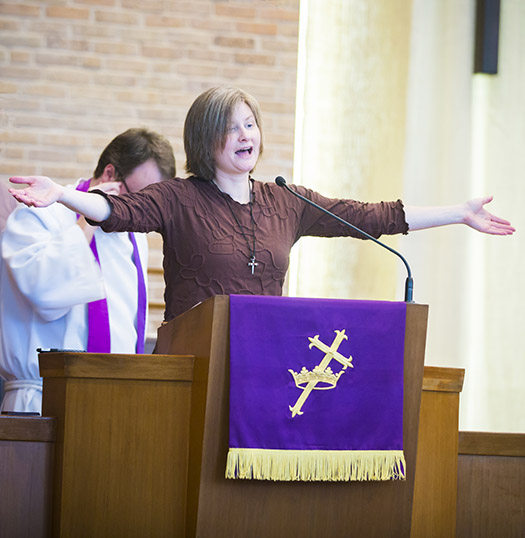
Contextual Education II takes seriously the role of ministry settings as “teaching parishes.” In Con Ed II, second-year students serve in ecclesial settings, applying theory and learning from the classroom to a ministry context.
At the end of the second year of Contextual Education, learning outcomes will include:
- Practice of ministry skills in five areas: Leadership and Administration; Gathering, Proclamation, and Engagement; Pastoral Care and Community Care; Outreach, Mission, and Advocacy; and Religious Education and Spiritual Formation
- The benefit of on-site mentoring with an experienced clergyperson
- Experience in a clergy-led, supervised reflection group with colleagues
- Opportunities to exercise reflective practices of leadership and ministry
- Greater clarity in vocational identity and calling
Con Ed II Overview
In Contextual Education II, typically taken in the second year, students practice ministry in ecclesial settings. All MDiv students must successfully complete six credit hours of Contextual Education II, 3 credit hours each in the fall and spring semesters.
For students enrolled prior to Fall 2023:
In addition to the site work and reflection group, students are required to enroll in one three-hour Introductory Arts of Ministry (IAM) course and one Contextual Education Elective (CEE). The IAM and CEE courses may be taken in either the fall or spring semester and may be taken independently of each other.
Students choose a site for their Contextual Education II placement in which they work eight hours per week. The site, however, must be able to fulfill the five areas of ministry: Leadership and Administration; Gathering, Proclamation, and Engagement; Pastoral Care and Community Care; Outreach, Mission, and Advocacy; and Religious Education and Spiritual Formation. All students are supervised by a site mentor who is a ministry leader, typically a full-time employed, ordained pastor or person with comparable ministry experience and a graduate of an accredited seminary or possessing comparable education. Students who are employed in churches typically work in those churches as their second-year Con Ed placement.
Along with the site work, students are assigned to a reflection group facilitated by an experienced practitioner in ordained pastoral ministry. Reflection groups meet bi-weekly, rotating among the local ecclesial settings where students are serving. Reflection groups are organized by geographic location and meet on Mondays throughout the academic year.
International students who qualify for Curricular Practical Training (CPT) may enroll in Contextual Education II. For more information, refer to Candler’s Contextual Education handbook and the Emory University Office of International Student and Scholar Services (ISSS). International students must receive authorization in the semester prior to their enrollment in Contextual Education II.
The Contextual Education II program depends on community partnerships with area congregations to help form the next generation of pastors. Students begin looking for a Con Ed II site in January of their first year and will be provided a list to find a site that fits their vocational goals and the requirements of the Contextual Education II program.
Ecclesial sites and site mentors are essential to the Contextual Education II program and their participation provides an invaluable opportunity for students to experience the practice of ministry. If you would like to become a site participant, please review our expectations and requirements.
Con Ed II Student Reflection
Dominique Grant King MDiv ’24 on her Con Ed II experience at Ebenezer Baptist Church in Atlanta.
